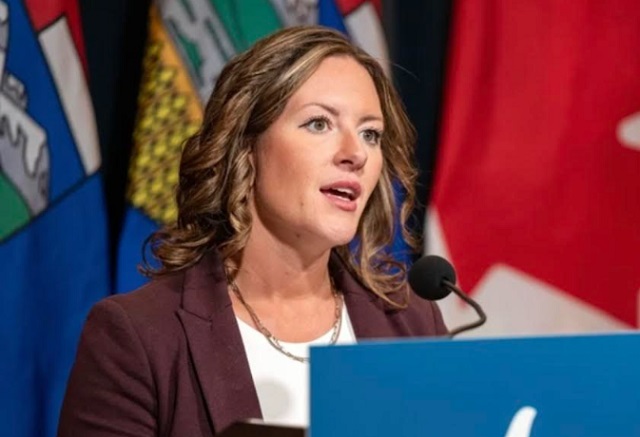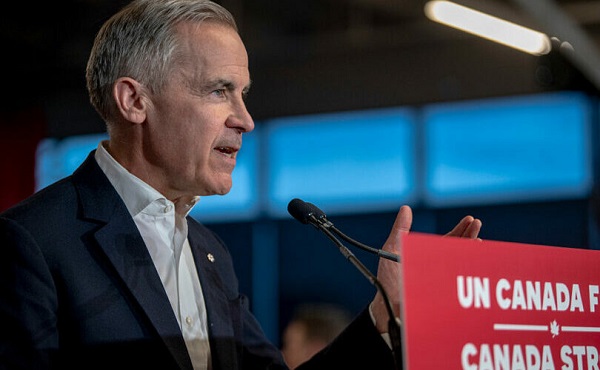Alberta
Emissions cap “will not be tolerated in Alberta” – Letter to Environment Minister Guilbeault

Dear Minister Steven Guilbeault,
The federal government’s draft Regulatory Framework to Cap Oil and Gas Sector Greenhouse Gas Emissions represents a de facto production cap on Alberta’s oil and gas sector. This cap is not realistic or effective, will not achieve its grandiose emissions targets, and will not be tolerated in Alberta.
Today, Alberta is efficiently and effectively regulating and driving emissions from all industrial sectors, including oil and gas, and has been doing so successfully for decades. Our technical submission outlines how your proposed oil and gas emissions cap will undercut this work, and the severe consequences that it will impose on Albertans and all Canadians.
In no way does Alberta’s technical submission alter our province’s position that the proposed emissions cap is unconstitutional. As set out in Section 92A of the Constitution Act, 1867, Alberta has exclusive jurisdiction to manage the rate of non-renewable natural resources production and operational aspects of their development in our province.
If implemented, this cap would have a devastating impact on the economies of Alberta and all of Canada. Analysis from the Conference Board of Canada shows that it would reduce Canada’s GDP by up to $1 trillion between 2030 and 2040 and create up to 151,000 lost jobs across Canada by 2030. Oil and gas production would be curtailed, tens of thousands could be out of work, and the economic impact would be felt from coast to coast.
We have identified an overwhelming number of flaws in your government’s proposed framework. For example, your assumed production forecasts – which form the basis of the cap – are from 2019. Alberta’s total oil and natural gas production has already risen past 2019 levels, and multiple forecasts project oil sands production to increase significantly by 2030. Similarly, the technologies needed to massively abate emissions in the oil and gas sector either don’t yet exist or aren’t being developed at the rate and scale that your modelling requires.
Many of these technologies and investments are supported by Alberta and will eventually deliver real and sustained reductions, but not by 2030. As well, our submission clearly demonstrates that:
• The proposed cap would violate Section 92A of the Constitution, and result in oil and gas production cuts and shut-ins in Alberta.
• It is based on a flawed regulatory framework and policy design that is ineffective, inefficient and will not produce the intended emission reductions.
• The proposed cap will negatively impact Alberta’s economy, as well as the economies of provinces and territories across the country, including the Canadian economy overall.
• It will undercut Canada’s competitiveness and drastically reduce investments in clean technologies like carbon capture, which are critical to meaningfully reducing emissions in the coming years.
• It is unnecessary and will undermine effective provincial-led decarbonizing approaches and initiatives already underway or proposed in Alberta and across Canada.
• It will lead to carbon leakage, with oil and gas production and greenhouse gas emissions increasing in other countries with less robust environmental and human rights standards.
Alberta is confident that the many of issues raised in this document are shared by other provinces and industry leaders, both within the oil and gas sector and beyond.
All greenhouse gas emissions have the same global impact, regardless of the sector or region in which they are produced. Instead of pursuing this unconstitutional cap, we are calling on your government to immediately halt further development and begin meaningful collaboration within established provincial regulatory regimes on oil and gas regulation and emissions reductions.
Alberta would welcome federal investment to help the oil and gas industry – and other industries – advance and adopt technology to reduce emissions to support our goals of carbon neutrality by 2050.
Alberta aspires to achieve a carbon neutral economy without compromising affordable, reliable, and secure energy for Alberta, Canada and the world. We know this relies on and requires investment to advance clean technology solutions.
We invite you to join us in implementing our Emissions Reduction and Energy Development Plan to achieve carbon neutrality while continuing the development of Alberta’s world-class natural energy resources for Canada and the world.
Sincerely,
Rebecca Schulz
Minister of Environment and Protected Areas
Alberta
Alberta takes big step towards shorter wait times and higher quality health care

From the Fraser Institute
On Monday, the Smith government announced that beginning next year it will change the way it funds surgeries in Alberta. This is a big step towards unlocking the ability of Alberta’s health-care system to provide more, better and faster services for the same or possibly fewer dollars.
To understand the significance of this change, you must understand the consequences of the current (and outdated) approach.
Currently, the Alberta government pays a lump sum of money to hospitals each year. Consequently, hospitals perceive patients as a drain on their budgets. From the hospital’s perspective, there’s little financial incentive to serve more patients, operate more efficiently and provide superior quality services.
Consider what would happen if your local grocery store received a giant bag of money each year to feed people. The number of items would quickly decline to whatever was most convenient for the store to provide. (Have a favourite cereal? Too bad.) Store hours would become less convenient for customers, alongside a general decline in overall service. This type of grocery store, like an Alberta hospital, is actually financially better off (that is, it saves money) if you go elsewhere.
The Smith government plans to flip this entire system on its head, to the benefit of patients and taxpayers. Instead of handing out bags of money each year to providers, the new system—known as “activity-based funding”—will pay health-care providers for each patient they treat, based on the patient’s particular condition and important factors that may add complexity or cost to their care.
This turns patients from a drain on budgets into a source of additional revenue. The result, as has been demonstrated in other universal health-care systems worldwide, is more services delivered using existing health-care infrastructure, lower wait times, improved quality of care, improved access to medical technologies, and less waste.
In other words, Albertans will receive far better value from their health-care system, which is currently among the most expensive in the world. And relief can’t come soon enough—for example, last year in Alberta the median wait time for orthopedic surgeries including hip and knee replacements was 66.8 weeks.
The naysayers argue this approach will undermine the province’s universal system and hurt patients. But by allowing a spectrum of providers to compete for the delivery of quality care, Alberta will follow the lead of other more successful universal health-care systems in countries such as Australia, Germany, the Netherlands and Switzerland and create greater accountability for hospitals and other health-care providers. Taxpayers will get a much better picture of what they’re paying for and how much they pay.
Again, Alberta is not exploring an untested policy. Almost every other developed country with universal health care uses some form of “activity-based funding” for hospital and surgical care. And remember, we already spend more on health care than our counterparts in nearly all of these countries yet endure longer wait times and poorer access to services generally, in part because of how we pay for surgical care.
While the devil is always in the details, and while it’s still possible for the Alberta government to get this wrong, Monday’s announcement is a big step in the right direction. A funding model that puts patients first will get Albertans more of the high-quality health care they already pay for in a timelier fashion. And provide to other provinces an example of bold health-care reform.
Alberta
Alberta’s embrace of activity-based funding is great news for patients

 From the Montreal Economic Institute
From the Montreal Economic Institute
Alberta’s move to fund acute care services through activity-based funding follows best practices internationally, points out an MEI researcher following an announcement made by Premier Danielle Smith earlier today.
“For too long, the way hospitals were funded in Alberta incentivized treating fewer patients, contributing to our long wait times,” explains Krystle Wittevrongel, director of research at the MEI. “International experience has shown that, with the proper funding models in place, health systems become more efficient to the benefit of patients.”
Currently, Alberta’s hospitals are financed under a system called “global budgeting.” This involves allocating a pre-set amount of funding to pay for a specific number of services based on previous years’ budgets.
Under the government’s newly proposed funding system, hospitals receive a fixed payment for each treatment delivered.
An Economic Note published by the MEI last year showed that Quebec’s gradual adoption of activity-based funding led to higher productivity and lower costs in the province’s health system.
Notably, the province observed that the per-procedure cost of MRIs fell by four per cent as the number of procedures performed increased by 22 per cent.
In the radiology and oncology sector, it observed productivity increases of 26 per cent while procedure costs decreased by seven per cent.
“Being able to perform more surgeries, at lower costs, and within shorter timelines is exactly what Alberta’s patients need, and Premier Smith understands that,” continued Mrs. Wittevrongel. “Today’s announcement is a good first step, and we look forward to seeing a successful roll-out once appropriate funding levels per procedure are set.”
The governments expects to roll-out this new funding model for select procedures starting in 2026.
* * *
The MEI is an independent public policy think tank with offices in Montreal, Ottawa, and Calgary. Through its publications, media appearances, and advisory services to policymakers, the MEI stimulates public policy debate and reforms based on sound economics and entrepreneurship.
-

 2025 Federal Election2 days ago
2025 Federal Election2 days agoRCMP memo warns of Chinese interference on Canadian university campuses to affect election
-

 2025 Federal Election1 day ago
2025 Federal Election1 day agoResearchers Link China’s Intelligence and Elite Influence Arms to B.C. Government, Liberal Party, and Trudeau-Appointed Senator
-

 Energy2 days ago
Energy2 days agoTrump signs four executive orders promoting coal industry
-

 COVID-191 day ago
COVID-191 day agoFauci, top COVID officials have criminal referral requests filed against them in 7 states
-

 2025 Federal Election1 day ago
2025 Federal Election1 day agoMark Carney vows to provide sterilizing puberty blockers to children ‘without exception’
-

 2025 Federal Election2 days ago
2025 Federal Election2 days agoThe status quo in Canadian politics isn’t sustainable for national unity
-

 Censorship Industrial Complex20 hours ago
Censorship Industrial Complex20 hours agoFormer residential school student refutes ‘genocide’ claims, recalls positive experience
-

 Bjorn Lomborg1 day ago
Bjorn Lomborg1 day agoThe stupidity of Net Zero | Bjorn Lomborg on how climate alarmism leads to economic crisis










